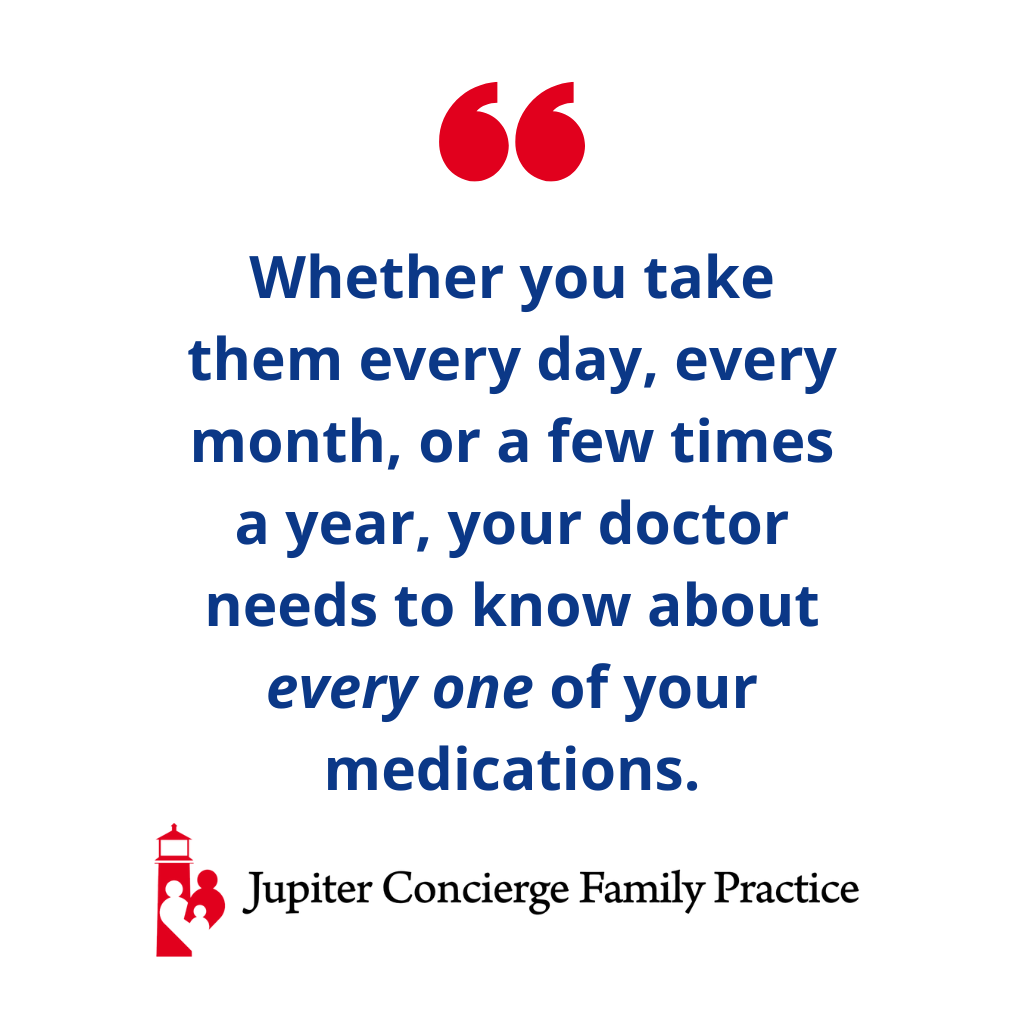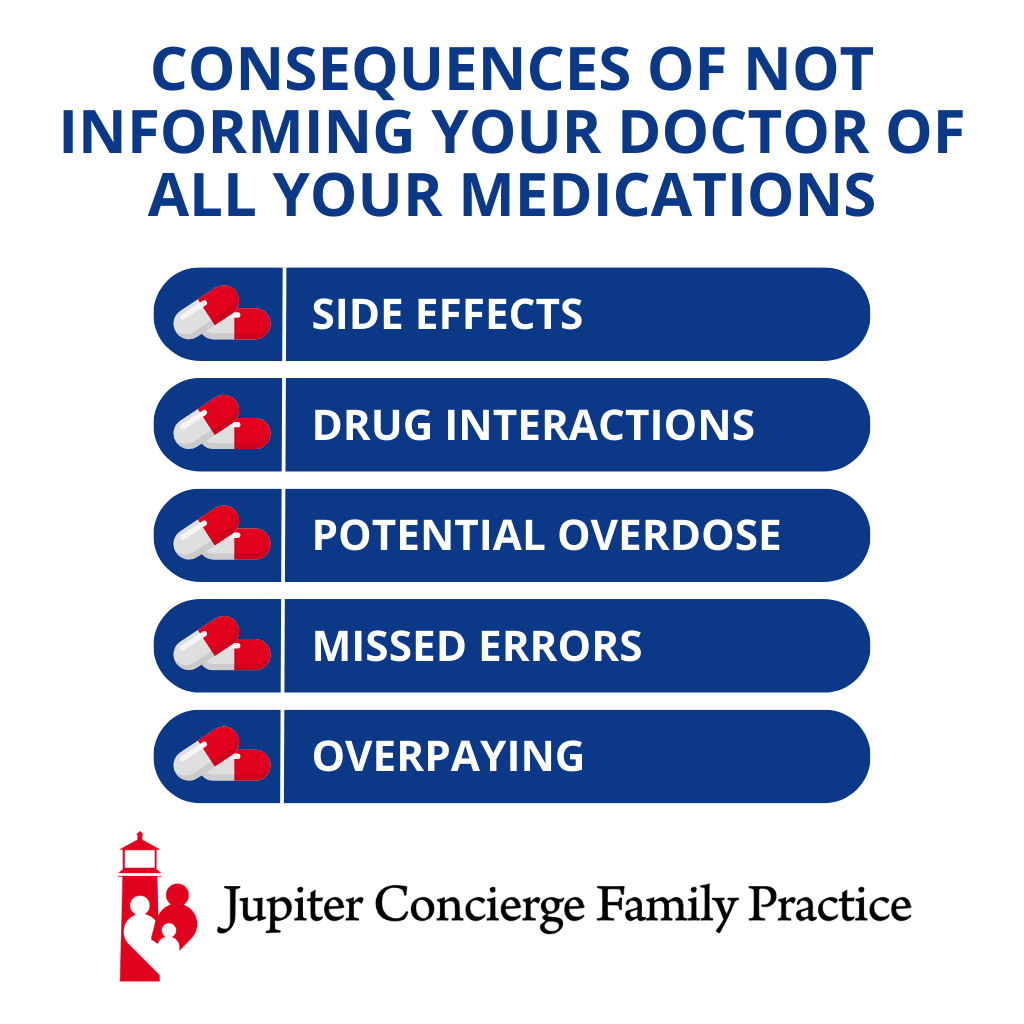
It might seem like a no-brainer that your physician needs to know all the medications you’re taking. Obviously, you might think.
But you might be surprised to know how often patients don’t tell their doctors everything they’re taking. Here’s how it happens, and why it matters.
What Qualifies as ‘Medication’?
Sometimes patients don’t share all their medications with their doctors because they don’t think of what they’re taking as medication.
Very often, people confuse the word medication with prescription. Medications, especially for the purposes of this discussion, are any substances we ingest or apply to affect body processes or treat problems. So…
- Over-the-counter products are medications.
- Supplements are medications.
- And, yes, prescriptions are medications.
Whether you take them every day, every month, or a few times a year, your doctor needs to know about every one of your medications.
Bring in the Bottles
The absolute BEST way for patients to clearly and accurately communicate what medications they’re taking to their doctors is to bring all their bottles (or packets) in during their visit.
Why not just write out a list? While that’s certainly better than nothing, a written list still increases the possibility of missing a crucial detail.
For example, you may know that people in various parts of the country use “Coke” to refer to “soda.” That’s a fun instance of a language principle that happens all the time — including with common medications like over-the-counter painkillers.
People often refer to a painkiller they take at home as “Tylenol” when it’s actually an entirely different drug, such as ibuprofen. This doesn’t much matter in the realm of carbonated beverages, but it can be downright dangerous when it comes to medications — yes, including ibuprofen.
Other medications may have more active ingredients than you realize, or even problematic inactive ingredients.
So whatever you’re taking, bring the original containers to show your physician. That way they can get an accurate understanding of exactly what’s going into your body, the dosage, the frequency, and the purpose.
This holds even if it’s something you’re only taking occasionally, and even if it’s a supplement. Your physician needs to know them all.
Unintended Consequences
Why is it important that you share all your medications with your doctor? It’s because medications have side effects, supplements at high doses have pharmacologic properties, and sometimes supplements and/or medications can interact with each other.
When your physician doesn’t have the full picture, they can’t appropriately treat you. Here are some things that can go awry when your doctor doesn’t know all the medications you’re taking:
- Side effects. You could experience side effects you don’t realize stem from a medication. If you have persistent stomach pain, for instance, your doctor will have a harder time discovering the cause if they don’t know what you’re taking.
- Drug interactions. If you take more than one medication — including supplements and over-the-counter drugs — they have the possibility of interacting with one another. If someone is on eight or more medications, there’s a roughly 100% chance of drug interaction. And some interactions can be dangerous.
- Potential overdose. This can be especially true if you’re seeing multiple physicians. It’s possible you could be prescribed the same medication more than once under a different brand name, and you wouldn’t know. This could lead to an unintentional overdose.
- Missed errors. Pharmacies can make mistakes. So even if you tell your doctor, “I’m taking what you prescribed for me,” that’s still not quite conclusive. I go over my patients’ prescriptions to ensure the dosage and medication they received is correct.
- Overpaying. Your doctor may be able to help you find a better price for a medication. Perhaps a generic is available for the brand name you’ve been taking, or the medicine can be found in a different (less expensive) form. But your physician can’t help you with price if they don’t know you’re taking it.
Final Thoughts
Your physician is — or at least should be — your health accountability partner. To avoid possible unintended health pitfalls, it’s essential that you communicate with your doctor so they know all the medications you’re taking. This helps you both create a viable, appropriate plan for your customized health journey.

Dr. David Rosenberg
Dr. Rosenberg is a board-certified Family Physician who obtained a BS in Chemistry at Georgia's Mercer University in 1983 and a medical degree from the University of Miami in 1988. He completed his residency in Family Medicine at The Washington Hospital in Washington, Pennsylvania, in 1991 and then practiced Emergency Medicine at Palm Beach Gardens Medical Center for two years. In 1993 he started private practice in Jupiter.
Dr. Rosenberg has been married to his wife Mary for 38 years and they have three grown children together. Some of his interests include being a huge baseball fan, sailing, snow skiing, self-development, and learning to play piano.


